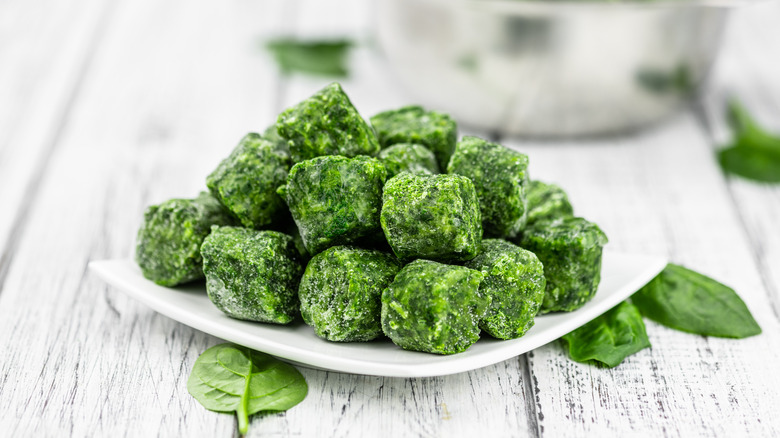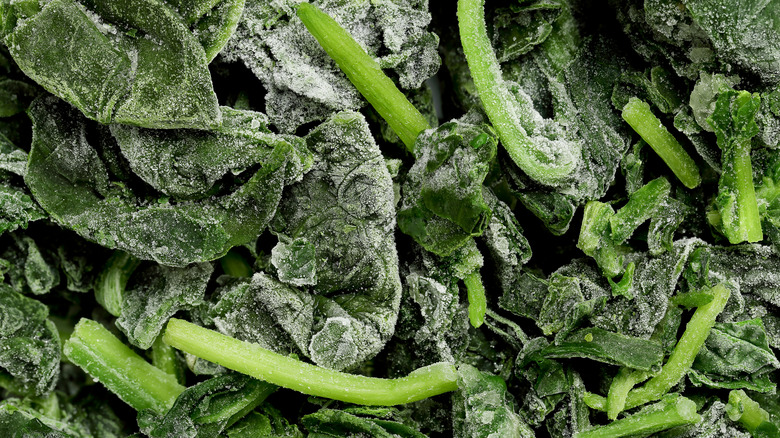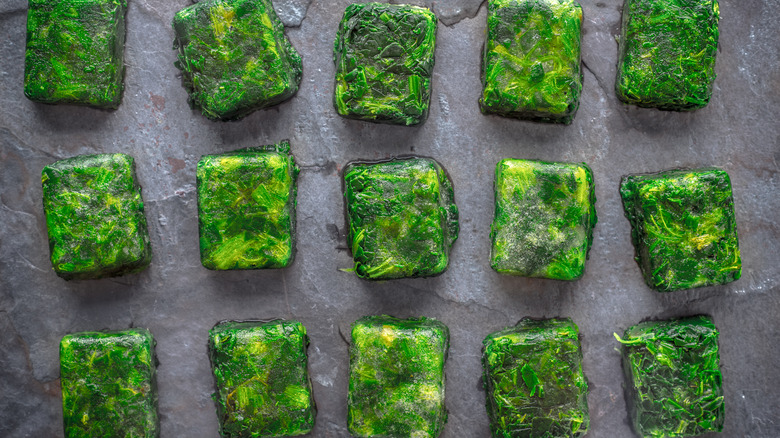Why Frozen Spinach Is The Better Long-Lasting Pick Over Canned
Eating vegetables — canned, frozen, or fresh — is better than eating none at all. A study from Harvard Medical School recommends that the daily intake of fruits and vegetables per day is five portions. Squeezing in these five can be difficult; life is busy. Alongside this, fresh produce spoils, and using it up before it goes bad can be challenging. Turning to canned or frozen vegetables is a great alternative to reduce waste and still get our daily intake, and spinach is a versatile leafy green preserved in various ways to make life easier. But which of its forms is most nutritious in how it's preserved?
Frozen spinach is the saving grace. Its frozen form allows it to last longer than fresh and remain more colorful and nutritious than canned. While canned spinach will undoubtedly last through the apocalypse, frozen spinach has a shorter shelf life but remains closer to the taste and nutrients provided in fresh spinach. Overall, this unquestionably makes it the better long-lasting pick — especially if you're looking to get in one of your five helpings a day.
It's all about the processing
If stored in appropriate conditions, canned vegetables, including spinach, usually have two to five years of shelf life. Yet, even the use-by date refers to the quality of the vegetable, not the safety related to consuming the product — in other words, it could last even longer. Frozen spinach, on the other hand, will last for three months. Surely this evidence is enough to suggest that canned spinach is the superior, long-lasting pick, but it's essential to assess if it's a nutritional choice too. Pre-processing, frozen and canned spinach are very similar and possess the same nutrients or near equivalent to fresh. It's how they are processed that affects these levels.
Canned spinach requires much more processing than frozen, affecting its color, taste, and nutritional value. The processing for canned spinach is longer than that of frozen (which is merely blanched before freezing), which starts to draw out the nutrients inside. Canned spinach can contain high amounts of sodium, sugar, and other preservatives, ultimately affecting how "fresh" and healthy it really is. There are still some relatively nutritional canned spinach brands out there, though. Frozen spinach can also be processed with added sodium, but generally in much lower amounts than in canned.
Frozen spinach is best
So what else does that glorious frozen spinach have to offer? Although it's processed to a certain degree, frozen spinach may be superior to fresh. As mentioned above, fresh spinach loses nutrition (B vitamin in particular) as it ages. After sitting in your refrigerator for a week, it will not only deteriorate in appearance but also lose the precious nutrients that you chose it for in the first place. On the other hand, frozen spinach is processed immediately once harvested, so the nutritional time-lapse is shorter. This inevitably means it retains its nutritional value for much longer.
In this regard, the number of vitamins and fiber present in a cup of frozen spinach is much higher than in a cup of fresh spinach. So if you need a green injection — frozen spinach is where it's at. These arguments are all relative; if the frozen spinach you're using has high levels of sodium, then it may be less nutritious than fresh. And if you're using canned spinach free from additives, it may be healthier than some frozen spinach brands. On the whole, frozen spinach is the better long-lasting pick — it's more nutritious, better tasting, and retains its color. But it's essential to check product labels to ensure you're really choosing the healthiest, long-lasting choice.


